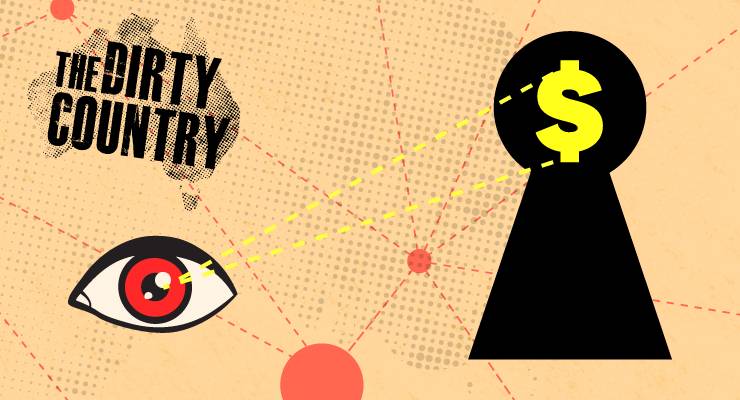
This is day four of The Dirty Country: Corruption in Australia. Read the whole series here.
When one thinks about the pernicious influence of money in politics, the United States naturally comes to mind.
In the 2016 US presidential election cycle, Hillary Clinton raised US$1.19 billion for the general election alone, and Donald Trump raised US$647 million. Add the fact that primary elections also involved huge sums of money. Counting Congressional races, the total price tag for the 2016 elections was about US$6.5 billion.
Compared with that, money in Australian politics looks positively quaint. In the 2016 Australian federal election there was about A$63 million in public funding to all parties and total expenditure from all sources for the entire year was about A$156 million.
Australia’s electoral donations were only one-fifth of that in the US on a per capita basis.
So does this mean there is comparatively little influence from money in Australian politics? No.
Start with this fact: most donations go directly to political parties. There was only slightly more than A$1.7 million in individual donations to candidates in 2016; 77% of candidates reported zero donations.
This gives political parties tremendous power over their candidates — even before they potentially enter parliament. Those who don’t toe the party line risk having their campaigns under-resourced. This directly restricts what political scientists and economists refer to as “political competition”. And, as in any market, lack of competition is bad. In this case, it hurts voters.
As well, federal political donations in Australia are anything but transparent. Any donation under $14,300 does not need to be reported to the Australian Electoral Commission. Given the relative paucity of money in Australian politics that is a very high effective threshold.
Unbelievably, multiple donations of $14,299 don’t need to be reported. One would struggle to find a less well-designed policy rule in modern Australian history. Even in the US the maximum individual donation per election to a candidate is US$2800 — and even $200 donations (or donations totalling $200 in an election cycle) have to be reported.
Worse still, it is relatively easy for donors in Australia — especially large ones — to hide their donations by running them through shell companies and other entities that obscure their true source. It’s no wonder the Centre for Public Integrity estimated that since 1999 more than $1 billion in “dark money” has been donated to parties and candidates.
The lack of any cap on the amount of donations leads to exactly what one would expect: a small number of donors account for a huge proportion of total donations. The Centre for Public Integrity reports that since 1999 five individuals have made more than one-quarter of all Australian political donations. Donations of more than $1 million comprise more than 30% of total donations.
There are some tighter rules at the state and territory level, with disclosure thresholds as low at $1000 (in New South Wales, Queensland, Western Australia and the ACT), and caps of $4000 in Queensland, $4160 in Victoria, and $6600 in NSW. But the rules at the federal level are incredibly weak.
Large donors often make similar donations to both parties. In the most recent financial year the Australian Hotels Association gave $154,000 to the Coalition and $271,000 to Labor. Woodside Energy gave $198,000 and $138,000 respectively. ANZ gave both sides $100,000.
This isn’t backing one side’s policy platform. The nice way to think of it is as a kind of hedge. The less nice way is that it guarantees access no matter who is in government.
There is little evidence of direct quid pro quo as a result of political donations in Australia. But how would we know when over the past two decades $1 billion — 35% of total donations — has been from unknown sources? Don’t forget that mafia dons don’t need to issue direct orders; their wishes are well known and, literally, go without saying.
Moreover, there doesn’t need to be a direct quid pro quo for money to buy a lot. Even just access to the politicians is valuable. It allows donors to make their case on all manner of public policies in a way that non-donors — at least those who don’t represent important lobby groups — have little chance of doing. It’s not hard to point to policies of both the Coalition and Labor that look awfully like what the business community or the union movement want them to be.
Maybe that’s reverse causation — that donors give money to like-minded, fellow policy travellers. But maybe not.
There is, functionally, a lot more money in Australian politics than one might think at first inspection. And our federal campaign finance rules –such as they are — are effectively a joke.
As the saying goes: “It’d be funny if it weren’t so serious.”
Do the rules around political donations need to be overhauled? Write to letters@crikey.com.au with your thoughts. Please include your full name to be considered for publication in Crikey’s Your Say section.
Richard Holden is professor of economics at UNSW Business School.








As Australia continues it inexorable slide into plutocracy and rule by oligarchs, following its mentor and idol the USA.
I disagree that that there is little evidence of qui pro quo. If you look at the policies of this current incompetent, corrupt and secretive government, can someone please point to one policy in the most 8 years that has been objectively for the common good. There could be no clearer example of quid pro quo that the ludicrous ‘gas-led recovery’ policy.
This mob are so brazen in their corruption that there is another more direct way to get what you want from politics: Get elected and get appointed to the cabinet. I cannot explain anything about dodgy Angus Taylor any other way.
I agree that donations definitely change the outcome of elections; the last election in Tasmania was won by a huge amount of donations from Clubs Australia lobbying against the Labor pledge to move pokies out of pubs into casinos only; also Clive Palmer’s historically large big spend against Labor and bill shorten at the last federal election arguably won it for the lnp, which was the intention surely.
If the fruits of true democracy, social equality, are ever to be enjoyed in OZ, ALL donations to political candidates and political parties needs to be banned. TOTALLY BANNED with all funding for candidates and political parties coming from the public purse.
Donations only allowed from adult private citizens registered to vote. Capped at $1500 per calendar year per donor. Businesses to donate to a Government Franchise Fund which is Distributed equally to all registered candidates. All donations declared in real time. That should fix it.
At the very least we need to have a tight cap on donations with full disclosure of everything over $1000 published within one month of receipt – weekly during an election campaign.
Public funding would be a good option if it could be funded by a wealth tax on those with assets of over, say, $10 million.